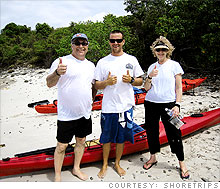Luring clients and employees to shore
FSB helps the owners of a travel firm boost sales, fix their website, and retain a top-notch crew.
 |
| Fantastic voyage: Shoretrips owners Julie and Barry Karp chart a new course. |
 |
| Travel treasures: Momentos of the Karps' business trips decorate their office walls. |
 |
| Fact-finding mission: The Karps (with a kayak guide) research a St. John excursion. |
 |
| Nate Kresse is creative director with Stamm Technologies in Milwaukee. |
 |
| Gail Robinson is a vice president with Banner Personnel in Chicago. |
 |
| Frances Yu is a senior manager with Deliotte Consulting in Chicago. |
(FSB Magazine) Glendale, Wis. -- ShoreTrips' business is booming, so you'd think owners Julie and Barry Karp could relax a bit. The couple developed a niche - arranging land tours for Caribbean cruise ship travelers. While cruise vessels have been disgorging hordes of passengers into ports and onto buses and walking tours for decades, their operators faced increased competition from landlubbers when the Karps founded their firm in 2001.
Since then, the Karps have located tour operators in scores of port cities and used them to deliver less costly and more intimate and original port experiences than the big ships offer. Clients come mostly through travel agents, who get commissions on any ShoreTrips tours they sell. The Karps put 75,000 travelers on their tours in 2006, and 100,000 last year. The firm has expanded into 38 Caribbean ports, Alaska, the Mediterranean, and the Baltic. Revenue hit $7.5 million in 2007 (up from $4.8 million in 2006), most of which went to the 2,400 tour operators with which ShoreTrips works. The Karps netted several hundred thousand dollars.
Not enough, they say. "We're just capturing about 1.5% of the cruise ship tour business," laments Barry Karp, 60. Julie, 58, is also dismayed. "There are 30,000 travel agents nationwide, and we work with only 6,000." If we doubled earnings, says Barry, "we'd set ourselves up nicely to sell out."
While other firms offer land excursions for cruisers, the Karps say these rivals aren't hurting their business. Still, most vacationers on cruises, unaware of -ShoreTrips, opt for tours arranged by their ships. The Karps have approached cruise lines about teaming up but have gotten the cold shoulder. They suspect that's because land excursions are profitable for the lines, which squeeze tour operators for lower prices than the Karps demand.
Another hurdle: ShoreTrips has trouble finding good employees and has let several recent hires go after a few months. The Internet also worries the Karps. Barry figures he spends $120,000 a year on downloadable marketing brochures, pay-per-click, and website maintenance. "Pay-per-click costs me $60,000 a year and yields only about $20,000 in profit," Barry says. ShoreTrips' custom-made software program tallies orders incorrectly and bungles various other calculations. The firm also dropped its brochure designers, who it says turned in poor work. Finally, ShoreTrips craves profitable new clients. To get them, should the Karps head for new ports? Bypass travel agents?
Of FSB's three experts, Gail Robson, a vice president at Banner Personnel, a Chicago staffing firm, is first up with thoughts on hiring and retention. She arrives and tours the ShoreTrips office, a warren of half-a-dozen rooms in a three-story building off I-43 north of Milwaukee. We gather in the lunchroom, where Barry details his hiring frustrations. "We once brought someone in and were so happy to get him we danced. But he was supposed to set up our meetings while we were in the Caribbean and didn't. We had to scramble and do it ourselves. He quit when we got back."
Robson suggests checking each applicant's performance in past jobs more carefully. Talk to the people the candidate worked for. Use the prior employer's HR department. Start by verifying salary and dates worked. Then ask bosses about the applicant's work quality, strengths, and weaknesses.
The Karps say they dislike prying into job seekers' pasts and fear that former employers will clam up. Robson says it's vital and fair to do this research. She tells the Karps that most employers will help. "An employer-to-employer trust evolves," Robson says. "Even if the policy is 'I can't talk,' they usually will." It's also wise to verify Social Security numbers and check for a criminal record, she adds. (Firms such as ChoicePoint or General Information Services will do it for about $50.)
After reading some ShoreTrips job postings on Milwaukeejobs.com, Robson is displeased. The position description is bland. "Market yourselves," she says. "The posting should be an ad for your firm. The travel business is very desirable." When the Karps note that they send each employee on an overseas trip annually and that ShoreTrips offers its staff health insurance, Robson is excited. "Add that! Put a 'careers' button on the first page of ShoreTrips' website to find well-traveled job seekers." Don't state the salary in the ad, she warns. Current staff peruse job sites and will be upset if ShoreTrips is offering more than they earn.
Robson is unhappy to hear that Shore-Trips employees earn an annual salary of only $27,000 for their first three months of probation. "Start them in the low 30s," she says. "It sets a tone and says you value your employees. You want them making enough so that they can focus on work and not on making ends meet."
"How do we know if we're paying enough?" asks Julie. "Check similar job postings," says Robson. "If you're not getting good résumés, pay more. If you need to go up $50 a week, do it."
Nate Kresse, a web expert with Milwaukee's Stamm Technologies, arrives next with ideas on better managing ShoreTrips' computer systems. Barry is plagued by faulty outside maintenance on ShoreTrips' record-keeping software. He paid a big firm for website graphics and brochures he calls "amateurish." Kresse, 33, tells him that the firms ShoreTrips hires might be too big. "They're used to larger firms and budgets. Try smaller firms." Or better yet, says Kresse, "hire a full-timer to maintain your software and optimize the website." When the Karps say they wouldn't know how to evaluate such an employee, Kresse suggests they bring in an outside firm to periodically review the techie's work. "What a great idea," exclaims Julie.
Kresse tells the Karps that the Shore-Trips website is hard to navigate. "It might work for a travel agent, but for the casual user it's unclear," he says. He recommends that the first page feature buttons that whisk visitors to other pages based on their needs. "First-time cruisers might click on a button that leads to a page that explains a lot. A travel agent would go to another," he says. Add a page that asks visitors to describe dream trips, Kresse says. "Have a page that shows all options for swimming with dolphins or riding horses," he suggests.
When Barry asks how his website can pop up better in searches using tools such as Google (GOOG, Fortune 500) and Yahoo (YHOO, Fortune 500), Kresse explains that when someone types the word "snorkel" or "Aruba" into a search engine such as Google, two types of links are displayed. Some appear because a firm paid Google to show them. Others organically appear because Google's computers track web pages that contain words with clues to the page's content.
To decide what a page is about, Google relies most heavily on words in web page titles, headlines, and bolded text. Kresse says the text in ShoreTrips' web pages needs to be jazzed up to jump out in web searches. For example, the language on one Shore-Trips page, "Fun in the Sun," gives no clue about the page's content. He suggests that the Karps change the wording to "Beach Day in Cozumel." Kresse checks the coding for the ShoreTrips website and sees that a vital component is absent: None of the words in Shore-Trips' pages have been coded as headlines or bold text. "It has to be rewritten," he says.
Frances Yu, a senior manager in the Chicago office of Deloitte Consulting, is up next with advice on growth. The Karps want new clients, but Yu is focused on the travel agents they now use. Forget about trying to woo all 30,000 U.S. travel agents, she says. "I bet 70% of your business comes from 30% of the travel agents that you use," Yu says. "Honestly assess the potential of the remaining 70%." Identify the 50 to 100 travel agents who steer the most business your way, and another 50 to 100 who have the potential to grow the fastest. "Those are your gold clients - focus on them," she says. "Visit them, call them, and take a hit for them when things go wrong," Yu urges.
Identify the next tier - a few hundred more high-volume or high-potential "silver" agents - and assign staff members to work more closely with them too. Then consider new types of travelers ShoreTrips might pursue. The Karps mention land-based travelers, foreigners, younger high-income earners, and planners who set up rewards for top salespeople. Yu tells the Karps to better research and understand those groups and points out that they may have to devise web pages with unique descriptions and keywords to entice them.
Days later, the Karps say they are thrilled with the experts' advice. Barry says Robson's proposed home page "careers" link inspired them to create a link for tour operators. "Frances's advice to focus on our best agents was fantastic," Julie says. "It takes a ton of pressure off me." She plans to rewrite pages so that they pop on the web, and will up the focus on high-end travelers. We will check back - and let you know when the Karps' ship comes in. ![]()
What's your advice? Talk back here to weigh in on the above questions.
Read more small business makeovers.
Could you be an entrepreneural couple? Take our quiz.
-
The Cheesecake Factory created smaller portions to survive the downturn. Play
-
A breeder of award-winning marijuana seeds is following the money and heading to the U.S. More
-
Most small businesses die within five years, but Amish businesses have a survival rate north of 90%. More
-
The 10 most popular franchise brands over the past decade -- and their failure rates. More
-
These firms are the last left in America making iconic products now in their twilight. More








